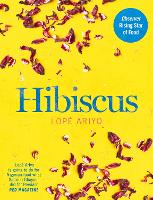


|
|
| book details |
Hibiscus: Discover Fresh Flavours from West Africa with the Observer Rising Star of Food 2017
By (author) Lopè Ariyo

|
This book is currently unavailable. Enquire to check if we can source a used copy
|
| book description |
‘I’m genuinely inspired.’ – Yotam Ottolenghi ‘For all its richness and mindboggling variety, African food has yet to cross over in the UK. With her freewheeling, boldly flavourful take on Nigerian cuisine, Lopè Ariyo could be the person to make it happen.’ – Observer Lopè Ariyo is the rising star of African cooking and Hibiscus, her first book, is packed with delicious dishes. An energetic and supremely talented cook, Lopè creates fresh, fuss-free meals that are full of flavour. With chapters including Fruits, Vegetables & Tubers; Grains & Pulses; Meat & Poultry and Baking & Desserts, there’s something for every occasion and for everyone. Nigerian-inspired flavours and cooking methods can transform everyday dishes into something spectacular. Whether it’s experimenting with new ingredients (Hibiscus Chicken), reimagining old favourites (Grapefruit and Guava Cheesecake; Baked Kuli Kuli Cod with Cayenne Yam Chips; Lagos Mess), exploring different techniques (Cheat’s Ogi, Chin Chin) or finding alternatives to everyday staples (Plantain Mash with Ginger, Corn and Okra Gravy; Nigerian Roast Veg), Lopè will help you discover all that modern Nigerian food has to offer.
| product details |
Normally shipped |
Publisher | HarperCollins Publishers
Published date | 1 Jun 2017
Language |
Format | Digital download
Pages | 192
Dimensions | 0 x 0 x 0mm (L x W x H)
Weight | 0g
ISBN | 978-0-0082-2539-1
Readership Age |
BISAC | cooking / regional & ethnic / african
| other options |
|
|
|
To view the items in your trolley please sign in.
| sign in |
|
|
|
| specials |
|
|
Let's stare the future down and, instead of fearing AI, become solutionists.
|
This first comprehensive biography of Cecil Rhodes in a generation illuminates Rhodes’s vision for the expansion of imperialism in southern Africa, connecting politics and industry to internal development, and examines how this fueled a lasting, white-dominated colonial society.
|
|
|
|
|